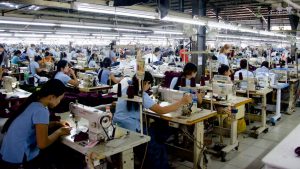By Chloe Mari A. Hufana
A WAGE INCREASE in the Philippine capital and nearby cities is likely in July, based on past decisions by the regional wage board, according to the country’s Labor chief.
“There is always an adjustment based on historical data,” Labor Secretary Bienvenido E. Laguesma told reporters on the sidelines of an event on Wednesday. “The challenge is how much.”
He declined to give an estimate.
The wage board in the National Capital Region (NCR) is expected to release its decision on the petitions to raise the daily minimum wage on or before July 16, the anniversary of the previous wage order.
To recall, the NCR wage board last July approved a P40 increase, which brought the daily minimum wage to P610 for nonagriculture sector workers and P573 for agricultural workers.
The Employers Confederation of the Philippines (ECoP) on Wednesday sought minimum wage-setting mechanisms that consider productivity, the market value of jobs, and the financial capacity of businesses, especially micro, small, and medium enterprises.
This would “ensure sustainable job creation and business growth,” the group said in a resolution signed at the National Employment Summit.
Wage hike decisions should also consider the impact on the majority of the population that will not benefit from such adjustments, ECoP said.
ECoP Governor and Philippine Chamber of Commerce and Industry Director Arturo “Butch” C. Guerrero III said the wage-setting mechanism they are pushing for is through a tripartite system, not a legislated one.
The Senate last February approved on third and final reading a bill increasing the daily minimum wage in the private sector by P100.
At the House of Representatives, separate bills that seek to increase wages of private sector workers by P150 to P750 have been filed.
“A wage increase of P150 across the board nationwide will lift many workers out of poverty wages. This moderate increase represents about 24% of the NCR minimum wage of P610 per day,” Federation of Free Workers President Jose Sonny G. Matula said.
Filomeno S. Sta. Ana III, coordinator of Action for Economic Reforms, said a wage hike will “maintain the level of real wages.”
“[The] recent quarter showed a slowdown in consumption, which could suggest that people’s reluctance to spend because of higher prices,” he told BusinessWorld in a Viber message.
“So, an increase in minimum wage will not necessarily translate into a wage-price spiral so long as the minimum wage is tempered and is intended to adjust for inflation,” he added. “The wage hike intends to recover [the] previous level of disposable income, which, however, was eroded by high inflation.
Rizal Commercial Banking Corp. Chief Economist Michael L. Ricafort told BusinessWorld in a Viber message that a wage hike is needed, especially by the poorest of the poor, to cope with rising prices.
“Inevitably, [wage hike will contribute to inflation], through second-round inflation effects as seen in 2022 and 2023,” he added.
However, ECoP said a P15 increase in minimum wages for NCR workers is at par with the consumer price index’s rise.
“[Wage increase is] a delicate balancing act and I would like to look at the situation where the members of the board will be able to consider and look at the arguments, positions, and the stand offered during the public hearing,” Mr. Laguesma told reporters on Wednesday.
Meanwhile, ECoP urged the Marcos administration to develop national resilience programs, social protection mechanisms, and transition strategies to support both workers and employers as artificial intelligence (AI), machine learning, and other disruptive technologies reshape the workplace.
ECoP said schools should prioritize developing “life skills, technological skills and soft skills” in students to prepare them for employment.
“These technological disruptions together with issues on climate change, demographic shifts, and geopolitics will create both opportunities and challenges that will impact social dialogue and collaboration among bipartite and tripartite partners in addressing issues in a technology-driven environment,” according to the resolution signed by ECoP Chairman Edgardo G. Lacson and President Sergio R. Ortiz-Luis, Jr.
ECoP’s Mr. Guerrero told reporters that national resilience programs are needed to address the impact of the pandemic on businesses.
“Many people are taking jobs just to have a job. But their skills are not adept for the job they’re doing. They’re overqualified. So, it’s a matter of matching the jobs. That’s why we have a jobs program to make it appropriate,” he said.
The Technical Education and Skills Development Authority (TESDA) offers upskilling programs, he added, but they are outdated. Instead, an industry-led upskilling program should be undertaken.
“The government manual is not updated. It no longer fits. So, it should be industry-led. It should come from the employers. The TESDA manuals should be in collaboration with their old manuals and that’s what we will roll out,” he said. “Because if you roll out an outdated manual, you just wasted your time trying to upskill these people.”





